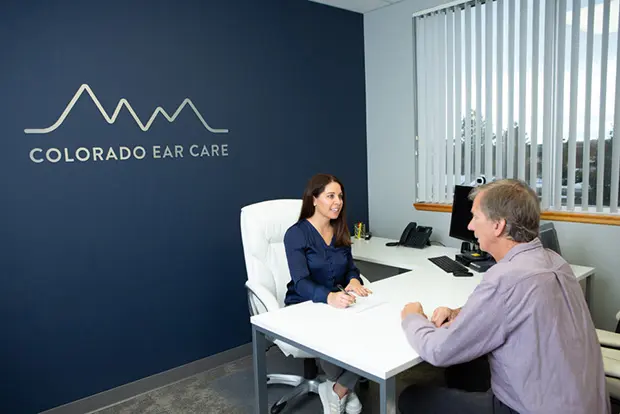Navigating the ins and outs of insurance can be confusing, as can certain aspects of hearing care. The Colorado Ear Care team is here to help you understand what your insurance options are and how you and your loved ones can receive the best in hearing care, regardless of your health insurance benefits.
If you’ve been operating under the assumption that hearing aids are covered under most or all health insurance plans, then you’re not alone. After all, hearing loss is a common and naturally occurring experience for many Americans. In fact, it is estimated that there are approximately 35 to 50 million people in the United States that have some form of hearing loss. With a population nearing 330 million, that means that between 10 to 15 percent of all Americans have hearing loss! A surprisingly large percentage, right? We think so, too.
Given such a large number of folks have hearing loss, it would be fair to assume that most major health insurance covers the cost of hearing aid technology, right? Well, if that was your assumption, you’d be incorrect, generally speaking. In the United States, insurance companies define hearing aids as “elective,” meaning they feel wearing hearing aids is a choice vs. being the necessity they are for so many.
While most major insurance plans do not cover the cost of hearing aid technology, there are certain benefits related to hearing loss, testing, and hearing aids that differ from state-to-state.
What hearing aid insurance benefits are there for Coloradans?
In Colorado, benefits do not extend to adults, but plans are required to cover children. In fact, health plans are required to provide benefits to children under the age of 18, but there are caveats. In order for coverage to apply to cover the cost of hearing aids to a child under the age of 18, the hearing aids must be deemed “medically necessary.”
Who determines what medically necessary means? Usually, it’s the prescribing physician, but insurance companies, as many of you have perhaps experienced in other aspects of your medical care, can have a certain influence over how coverage is deemed essential. Since hearing loss and hearing care is such an individualized and, well, intimate experience, we know how important it is to our patients that they get the care they need from their trusted provider.
Why hearing aid benefits for children are important
If hearing aids for a child under the age of 18 are considered medically necessary, then benefits will also include new hearing aids every five years when “the existing hearing aids no long meet the needs of the child,” as well as coverage for testing, fitting, technology adjustments, and auditory training the child might need.
This coverage we feel is essential to a child’s better hearing experience as 1) technology can advance dramatically over the course of five years; 2) given the rate of growth during childhood, certain equipment, like custom earmolds, can quickly become obsolete; and 3) hearing loss, in general, should be monitored on an annual basis in order to provide crucial adjustments or preventative recommendations that can help some to hear their best.
Are hearing aid benefits covered by Medicare?
Are hearing aid benefits covered by Medicare? Though you might think so, the answer is no. That said, there are certain caveats. According to Medicare’s own literature on the subject, Medicare Part B’s medical insurance will cover diagnostic exams as they pertain to hearing and balance, but, just as it is with certain standard insurance plan benefits that apply to children, your primary care physician or certain approved health providers must recommend these tests be administered in an effort to see if you need medical treatment.
Does the VA offer hearing aid benefits?
According to the US Department of Veterans Affairs website, they do offer hearing aids to those veterans who have a service-connected hearing disability, are former Prisoners of War, are Purple Heart recipients, are recipients of Title 38 benefits of United States Code 1151, and others.
The VA website provides information in much greater detail on the benefits related to hearing aids, how veterans are eligible, and how the hearing aid benefits are administered. As is it with most VA-related medical care, that care — the testing, treatment, and counseling — must be administered by VA medical professionals vs. a private practitioner or caregivers part of a non-VA-related hospital system. These benefits are important (and, of course, well-deserved!) but technology options can be limited.
Hearing aid benefits and insurance — the bottom line
As it often is, insurance benefits and how they apply to hearing aids can be murky in their coverage and limited in their application. What is clear, however, is the importance of developing a relationship with a trusted, effective, and transparent team of audiology professionals who are committed to providing you the best possible testing, treatment, and hearing care experience. It’s what you deserve, and it’s exactly what Colorado Ear Care strives to provide each and every patient in our care.

